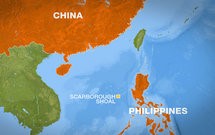 The clash between the Philippines and China echoing since April 2012 over the Scarborough Shoal in the South China Sea has seemingly been upped to the next level with the Philippine military all set to place the shoal under the jurisdiction of its Western Command in Palawan, moving from being under the Northern Luzon Command in Tarlac. Officials in the Philippines revealed earlier that the Chinese Coast Guard fired water cannons to drive away Filipino fishermen from the shoal and thus came the decision to bolster Manila’s defence under a single commander to improve “unity of effort and unity of command”, amid ongoing tensions with China.
The clash between the Philippines and China echoing since April 2012 over the Scarborough Shoal in the South China Sea has seemingly been upped to the next level with the Philippine military all set to place the shoal under the jurisdiction of its Western Command in Palawan, moving from being under the Northern Luzon Command in Tarlac. Officials in the Philippines revealed earlier that the Chinese Coast Guard fired water cannons to drive away Filipino fishermen from the shoal and thus came the decision to bolster Manila’s defence under a single commander to improve “unity of effort and unity of command”, amid ongoing tensions with China.
Although the Philippines military has termed the water cannon incident “really alarming”, they have refrained from retaliating with a military response. The Philippine military will surely be working out the transfer of jurisdiction despite the distance of the shoal to Palawan, 500 km south and much closer to another group of disputed islands—the Spratlys. Apparently, the Western Command possesses requisite assets that can address territorial defence and monitoring including conducting regular monitoring and reporting.
Significantly, the US Chief of Naval Operations, Admiral Jonathan Greenert, further bolstered the US-Philippines treaty alliance with a statement when he testified before a Senate Armed Services Committee in November 2013. This perhaps was the most unambiguous statement of the US support for the unprepared Philippine military, which fields a ragtag force composed of a handful of World War II-era patrol boats and a pair of decommissioned US Coast Guard cutters. Admiral Greenert assured that Washington will come to the aid of the Philippines in the event of a conflict with China over disputed waters in the South China Sea—which is an obligation given that the US has a treaty alliance in place with the Philippines. It is critical to note here that China claims about 90 percent of the South China Sea’s 3.5 million sq km (1.35 million sq mile) waters. The sea provides 10 percent of the global fisheries catch and carries $5 trillion in ship-borne trade each year. Taiwan, Malaysia, the Philippines, Brunei and Vietnam are contesting Chinese claims in the South China Sea.
Not surprisingly, the statement received flak from China as it urged the US to stay out of its dispute with the Philippines. A Chinese foreign ministry spokesperson stated that China would “like to point out that the US is not a party concerned in the dispute in the South China Sea.” The Sino-US relationship has been oscillating back and forth and the festering dispute over the Scarborough Shoal has only added another issue between Beijing and Washington. With the United States deploying approximately 60 ships in the Western Pacific as part of its Asia-Pacific rebalance, the situation will likely be overwrought.
In April 2012, government vessels from both nations faced off for several weeks at the Scarborough Shoal with the Chinese military taking cue from how it seized effective control of the Scarborough Shoal in the South China Sea in July 2012 from the Philippines without having to resort to war. Having found success in redefining the status quo in the above scenario, the Chinese leadership appears heavily inclined towards upstaging the rule-based international order and altering the status quo in its favour, now in case of the Senkaku Islands.
In response, the Philippines decided to move to filing an arbitration against China under the UN Convention on the Law of the Sea in the International Tribunal for the Law of the Sea (ITLOS). China has refused to participate in the case and if sources cited in the South China Morning Post are to be believed, the Chinese have offered “informally through back channels” withdrawal of its ships from the Scarborough Shoal, if Manila did the same and delayed international arbitration on the territorial dispute—an offer that outrightly has been rejected by Manila. On been asked for a clarification, Chinese foreign ministry spokesman, Qin Gang rejected any such proposal been made regarding Scarborough Shoal, known as Huangyan Island in China. Qin said, “… China’s determination of upholding territorial sovereignty and integrity is unshakeable. We will not do any trade with our territory and maritime rights and interest.”
The deadline for filing the arbitration case is March 30, 2014 set by the ITLOS. On the other hand, the Filipino side of the debate underlines that in case Manila misses this deadline, its position in case of the Scarborough Shoal will get significantly weakened and the consequent public perception will be unconstructive. The Philippines maintains that China should withdraw from the exclusive economic zone, where the Scarborough Shoal is located.
Recent trends in China’s aggressive behaviour include imposition of an air defence identification zone in northeast Asia and not appearing very willing regarding the freedom of navigation. It becomes increasingly patent of Beijing being apprehensive that the Philippines’ proposition of internationalising the South China Sea dispute would further be obscuring the situation over the Scarborough Shoal in particular and the South China Sea in general. The strategic turmoil taking place in Asia is in tandem with the growing power of the People’s Republic of China in the backdrop of the power differential that exists between China and other Asian players—in this particular case, the Philippines.
By Special Arrangement with The Centre For Land Warfare Studies (CLAWS) (http://www.claws.in)